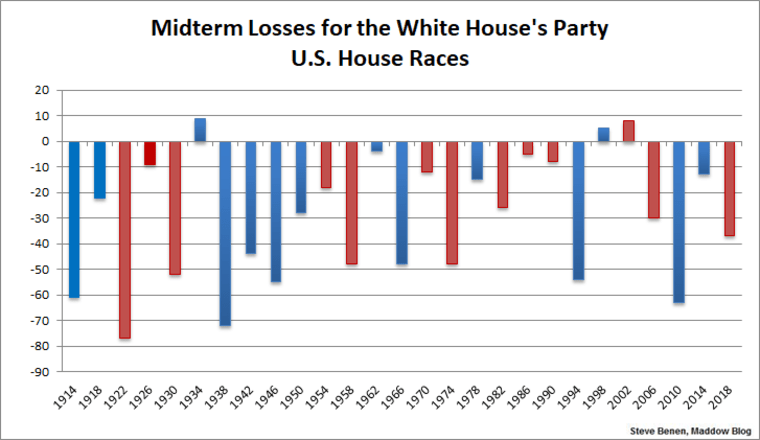
There is no consensus about the precise definition of a "wave" election, so there's been a fair amount of debate since Tuesday night about whether Democratic gains this year meet the standard. Whether the argument is constructive or not is a matter of perspective.
Perhaps there's another way of looking at this. I put together the above chart showing House losses and gains for the president's party by midterm cycle since 1914 (the first midterm cycle in which the House had 435 members). Red columns point to years in which the White House was held by a Republican, blue columns point to years in which the president was a Democrat.
Results from this year are still coming into focus, of course, which makes this a little tricky. As of this morning, most news outlets show Democrats with a net gain of 29 or so seats, but FiveThirtyEight projects Dems will end up with a net gain of 37, so I went with that for now.
Let's also talk a bit about averages. Between 1914 and 2014, the president's party lost an average of about 30 House seats in midterm elections. If we narrow the focus to midterms since World War II, the average is about 26. Since Watergate, the average is 23.
If we look only at a president's first midterm cycle -- in other words, after a president has been in office for two years, as opposed to six -- the average between 1914 and 2014 is nearly 33 seats. If we look only at Republican presidents, the average is about 27 seats.
With these metrics in mind, 2018 doesn't look great for Trump's GOP.
This year's Republican losses, barring major surprises in the final tallies, are higher than the historical average and the worst for a GOP president since the 1974 midterms in the aftermath of Watergate.
The exceedingly Republican-friendly Senate landscape notwithstanding, it's tough to see this as anything but a significant setback for the president and his party.